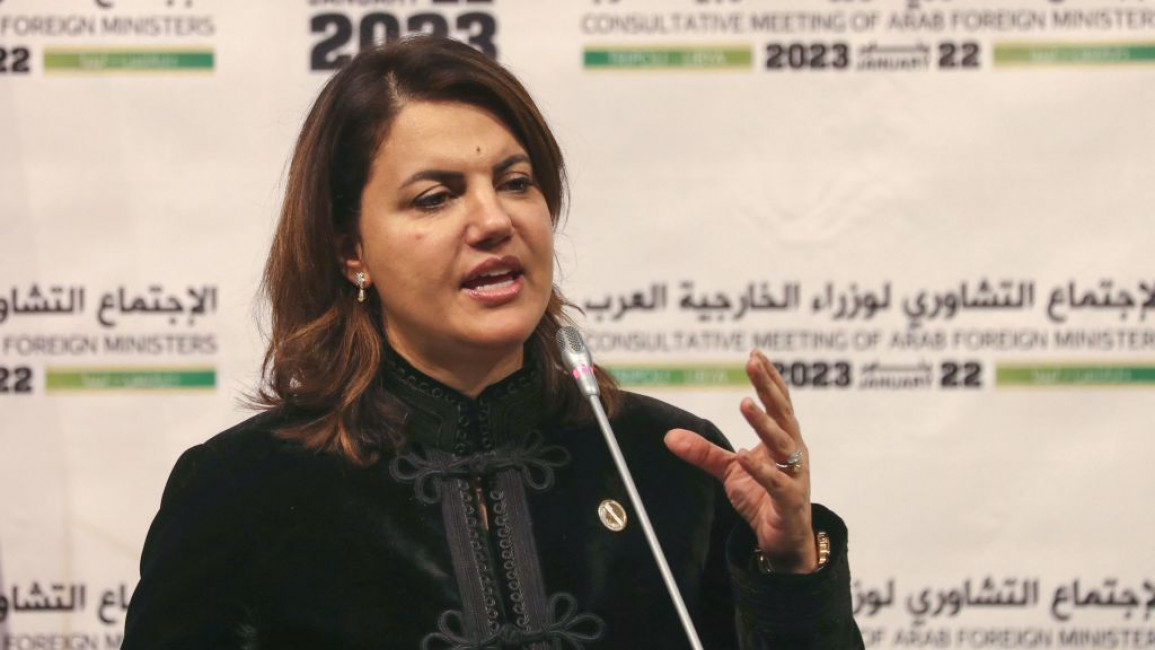Why was Libya FM Najla Mangoush fired? Has she fled to Turkey?
Libya's Tripoli-based prime minister, Abdul Hamid Dbeibah, sacked the country's foreign minister, Najla Mangoush, on Monday in an effort to contain growing outrage over her meeting with her Israeli counterpart last week, which prompted protests overnight in several Libyan cities.
Mangoush had said her meeting with Israeli Foreign Minister Eli Cohen in Rome was unplanned and informal, but an Israeli official told Reuters it had lasted two hours and was approved "at the highest levels in Libya".
The New York Times cited two unnamed officials in Mangoush's ministry as saying she'd flown to Turkey due to safety worries. The Associated Press also reported an unnamed foreign ministry official as saying she'd fled to Turkey.
Before being dismissed on Monday, Mangoush was suspended the previous day after reports of her meeting with Cohen became public. She reportedly travelled to Turkey after being suspended but before being fired.
Mangoush's meeting with Cohen caused outrage because Libya does not formally recognise Israel and there is widespread public support across the Libyan political spectrum for the Palestinian cause.
On Sunday evening, the Israeli foreign ministry announced the meeting in an official statement.
But on Monday, the ministry appeared to backtrack from the entire diplomatic furore, saying it was not behind the "leak" on the meeting in Rome.
"Contrary to what has been published, the leak regarding the meeting with Libya's foreign minister did not come from the foreign ministry or the foreign minister's office," the ministry said in a statement reported on Monday afternoon by AFP.
It did not offer details or clarify who was behind the so-called leak.
Israel's leader of the opposition Yair Lapid, a former foreign minister, had decried the leak on social media on Monday morning.
"Countries around the world this morning are looking at the irresponsible leak of the meeting of the Israeli and Libyan foreign ministers and asking themselves: Is this a country that you can have foreign relations with? Is this a country to be trusted?" he said.
"This is what happens when Eli Cohen, a man without any background in the field, is appointed foreign minister for only one year."
The Israeli Yedioth Ahronoth newspaper reported criticism from officials in the country's foreign ministry regarding the disclosure of the meeting.
Tripoli was on fire last night.
— Anas El Gomati (@AGomati) August 28, 2023
The street is echoing a frustration & it’s not just about Israel.
Its a call-out against the shadow politics of Libya’s unelected elite. Secret interim govts & backchannel deals even with Israel, sans public consent?
No transparency/representation pic.twitter.com/lPbosyResk
The unnamed officials said: "Countries that do not have diplomatic relations with Israel fear holding secret meetings, and it has been proven that the Israeli side does not know how to maintain the secrecy of these meetings."
They said communications are taking place with nations Israel has no relations with, adding that the goal is to turn these into diplomatic ties.
The dispute over the Mangoush-Cohen meeting has fed into Libya's internal political crisis, giving ammunition to critics of Dbeibah, one of Libya's two rival prime ministers, at a moment when the future of his interim government was already in question.
Protesters demonstrated in front of Libya's foreign ministry late on Sunday, causing some damage outside the building, where a large security presence was visible early on Monday.
Protests also took place in other parts of Tripoli, as well as other cities.
Burning tyres blocked some major roads in Tripoli on Monday but there was no sign of violence.
Mangoush's office tried to quell the anger late on Sunday, saying she had rejected a request for an official meeting with Cohen, but that they had met during an unplanned encounter while she was meeting Italian Foreign Minister Antonio Tajani.
An Israeli official disputed that account. "The meeting was coordinated at the highest levels in Libya and lasted almost two hours. The Libya prime minister sees Israel as a possible bridge to the West and the US administration," the official said.
In late 2020 and 2021, the United Arab Emirates, Bahrain, Morocco and Sudan agreed to normalise ties with Israel through the so-called "Abraham Accords" brokered by the United States, which sees further agreements as a key regional goal.
Normalisation with Israel is highly controversial across the Arab world and Palestinians consider it a betrayal of their national cause, pointing out that Israel continues to occupy the West Bank and besiege the Gaza Strip.
(Reuters, The New Arab, AFP, AP)



